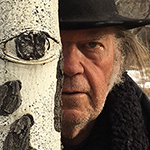Neil Young

Neil Young
Rock & Roll Hall of Fame Inductee, Activist and HumanitarianYoung’s recording life began with The Squires in Winnipeg, Canada, in 1963. After moving to Los Angeles in the mid-’60s to hopefully extend his scope, he found successes with Buffalo Springfield. The group released three albums which included many Neil Young songs, including their first single “Nowadays Clancy Can’t Even Sing” and Young classic “Mr. Soul.” Feeling somewhat limited in a band, he decided to trust his instincts and become a solo artist.
That change might have been the most far-reaching decision of Neil Young’s life. From his first self-titled solo album in 1969 through dozens of other releases, he has created a body of work known for creative risk-taking and culture-changing music, all in the name of following where his inquisitive spirit takes him. Along the way, Young has received numerous awards and accolades, including an Oscar nomination, induction into the Canadian Music Hall of Fame in 1982, and two inductions into the Rock & Roll Hall of Fame (for his solo work and as a member of Buffalo Springfield). In 2010 he won his first GRAMMY award, and in 2011 he won his second. In 2010, Neil Young received the GRAMMY’s MusiCares Person of the Year award for his artistic and philanthropic accomplishments. And in 2017, in his home country where he first began writing songs six decades ago, Young was inducted into the Canadian Songwriters Hall of Fame.
Young has shared his passion for visual mediums by directing films and releasing them through his production company Shakey Pictures. His filmography includes Human Highway (1982), Rust Never Sleeps (1979)–both these titles have been restored and released on Blu-ray and DVD. Also released are the documentary CSNY/Deja vu (2018), and Journeys (2012), Jonathan Demme’s third film documenting Neil Young’s music, following Heart of Gold (2006) and Trunk Show (2010).
Young’s philanthropy is as renowned as his musical body of work. As one of the original founders of Farm Aid in 1985, he continued to be a committed and informed member on the organization’s board of directors. He also was a founding member of The Bridge School, a school that ensures children with severe speech and physical challenges achieve full participation in their communities through the use of assistive technology, and was a co-organizer of 30 years of the Bridge School Concerts to help fund those efforts.
Other aspects of Neil Young’s visionary drive include his continuing exploration of new automobile technology through the creation of the Lincvolt car, the development of better sound reproduction through PonoMusic and now, the all-encompassing Neil Young Archives, where entire catalog of the artist’s music can be heard on a High Definition streaming subscription service. The Archives is the most advanced artist-run website to date, and is pointing the way, like Neil Young has always done, to the future. This never-ending exploration of the modern world matched by the kind of musical expression Neil Young has always strived for marks someone who, no matter what his past accomplishments may be, remains pointed in the direction of the future.
